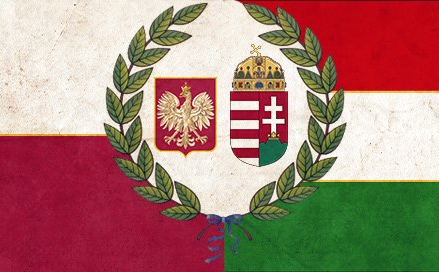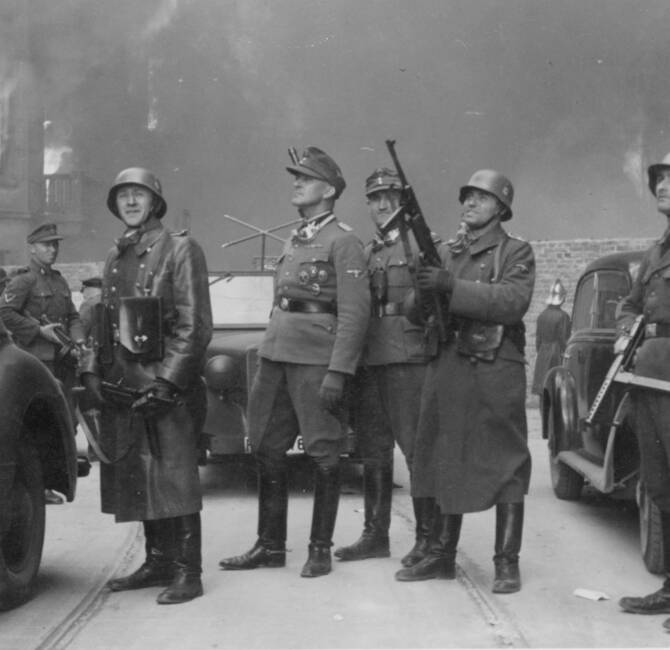By Bernadett Boór.
Hungary – At the cashier in the grocery store, no one is surprised to see chewing gum, batteries, chocolate … but scented water? Why are there lily-of-the-valley, jasmine or lavender perfumed waters near available at the grocery stores as Easter approaches?
It should be known that even today the habit of “locsolkodás” – literally, sprinkling, watering, Ed. – persists in Hungary. Erstwhile, all the girls of the village were watered, so that they’d turn into beautiful flowers for Easter Monday. The custom is less practiced today, especially in the big cities – but to tell the truth, thank God, it seems that this popular custom is experiencing a real renaissance. And just as the great tradition of folk dance has survived through the “táncház” movement, Easter watering seems to be moving into the city as well, and its social dimension may keep up.
But what is locsolkodás? With a bottle of scented water, or – with the neglected elegance of the old schooled ones – with a bucket of water in hand, young men go from house to house, like a good vine-grower inspecting his rows of grape vine, and look for any girl, of course waiting only for him.
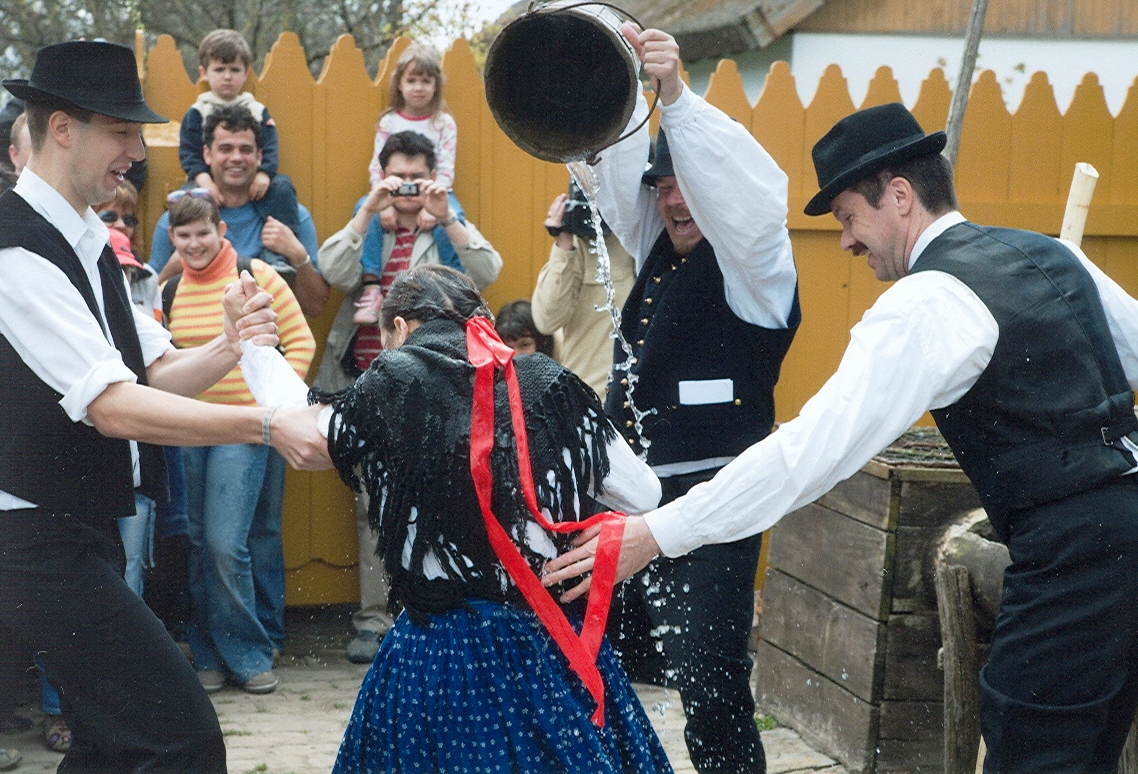
In fact, it is a pagan custom, but like so many other pagan customs, we have preserved it in the context of Christian holidays, and perhaps this habit of “locsolkodás” is more entrenched than one would think into the traditions of the Church and symbols … Splash with water is, from time immemorial, a symbol of purification. And since the baptism of our Lord Jesus Christ, it has been raised to a higher level, but the principle has remained the same: to wash away the past, and to give birth to a new, clean and true Man. Moreover, the baptisms of adults are often done at Easter!
To the sprinklers, girls give an egg in exchange for having been watered. The egg symbolizes rebirth, fertility and new life, and since Jesus Christ, its symbolic meaning has been enriched by the symbol of the resurrection.
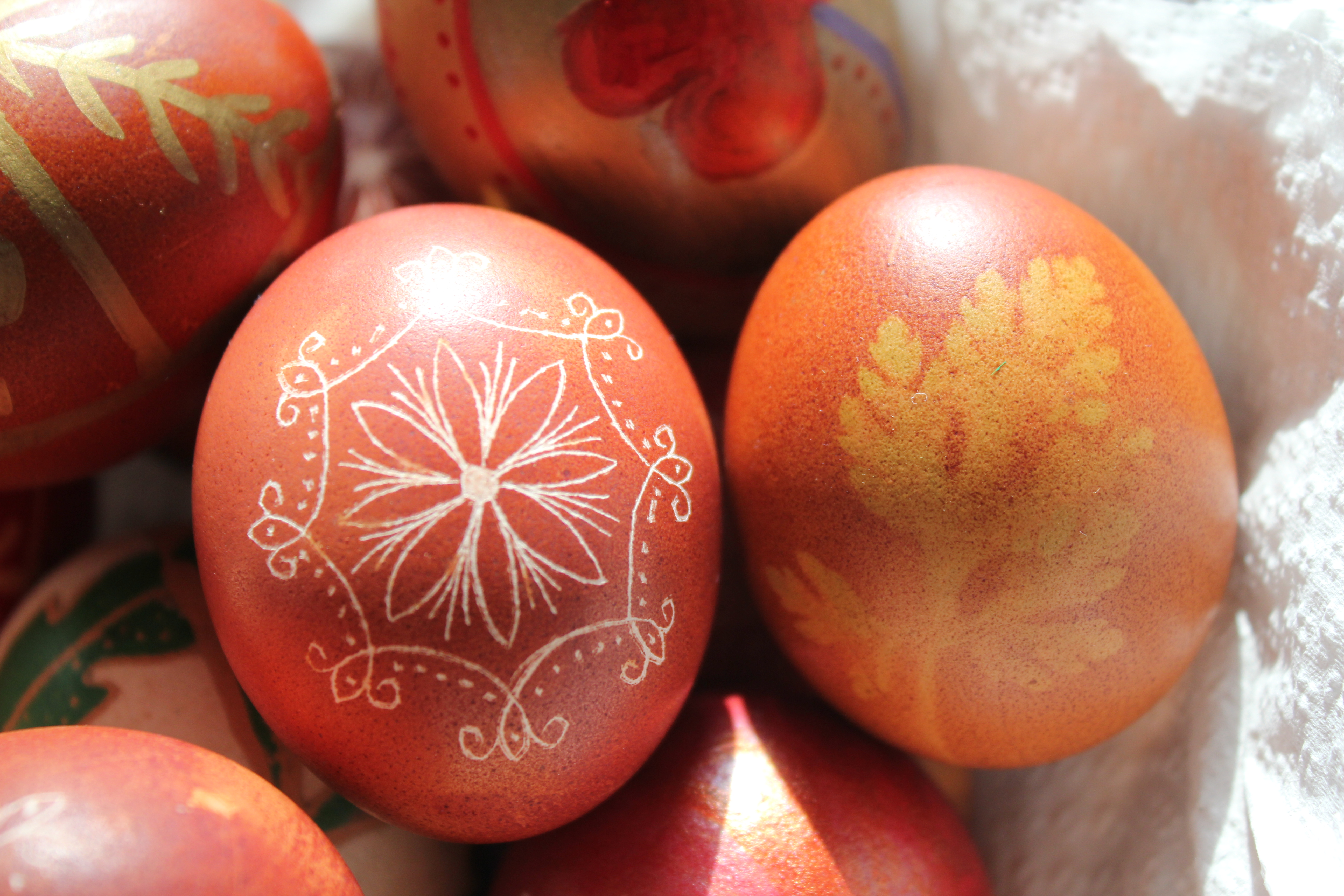
The younger fellows are proud to be able to water the girls, their small vial in their hands, reciting inexpertly their rhyme asking the girls permission to water them. Today, in these times eroding human relationships and communities, this kind of tradition is of particular importance. As one of my sprinklers told me last year, this is the only day where we are sure to see each other, to talk to each other and to get along, beyond simple “face-control”… even if the course of life has been able to distance us from each other. Traditionally, girls prepare red eggs for sprinklers. It is their gift to thank the interest of the sprinklers. For a moment, the girls’ gift to the sprinklers was usually chocolate or money but as the tradition became more polished (so did the táncház movement) old habits come back: eggs painted and engraved according to old techniques, with natural dyes and popular design. Before Easter, girls share tips and tricks as how to print patterns on their eggs, cooking eggs in vinegared onion broth, or using pre-cut patterns, or using beeswax for some decoration. Knowledge is transmitted by word: how to make the onion peel color better the egg, where to get the whitest eggs possible, how to prepare multicolored eggs, or learn to empty the eggs by blowing the contents out of the egg via a tiny hole through which the string will pass … Pff, 10 of emptied, still five to go … we will get there!
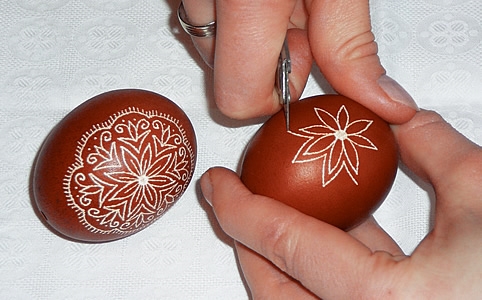
“Locsolkodás” is such a well-kept tradition in Hungary that as the Easter holidays approach, young people take leave of girls in their class and wish them “Many sprinklers”! And the girls are getting ready for it: the days before, they get together, cook cakes for the forecoming guests, paint the traditional red eggs. This is the Hungarian “mandala”. The egg cooked or emptied, but decorated, given in exchange for watering; even though these eggs do not always survive until the afternoon, the soil becoming slippery with all the buckets of water spilled watering after watering. The eggs in the pockets of young men, however, cause often the happiness of their mothers, who the next day can boast of their delicious gratin made of potatoes and colorful eggs!
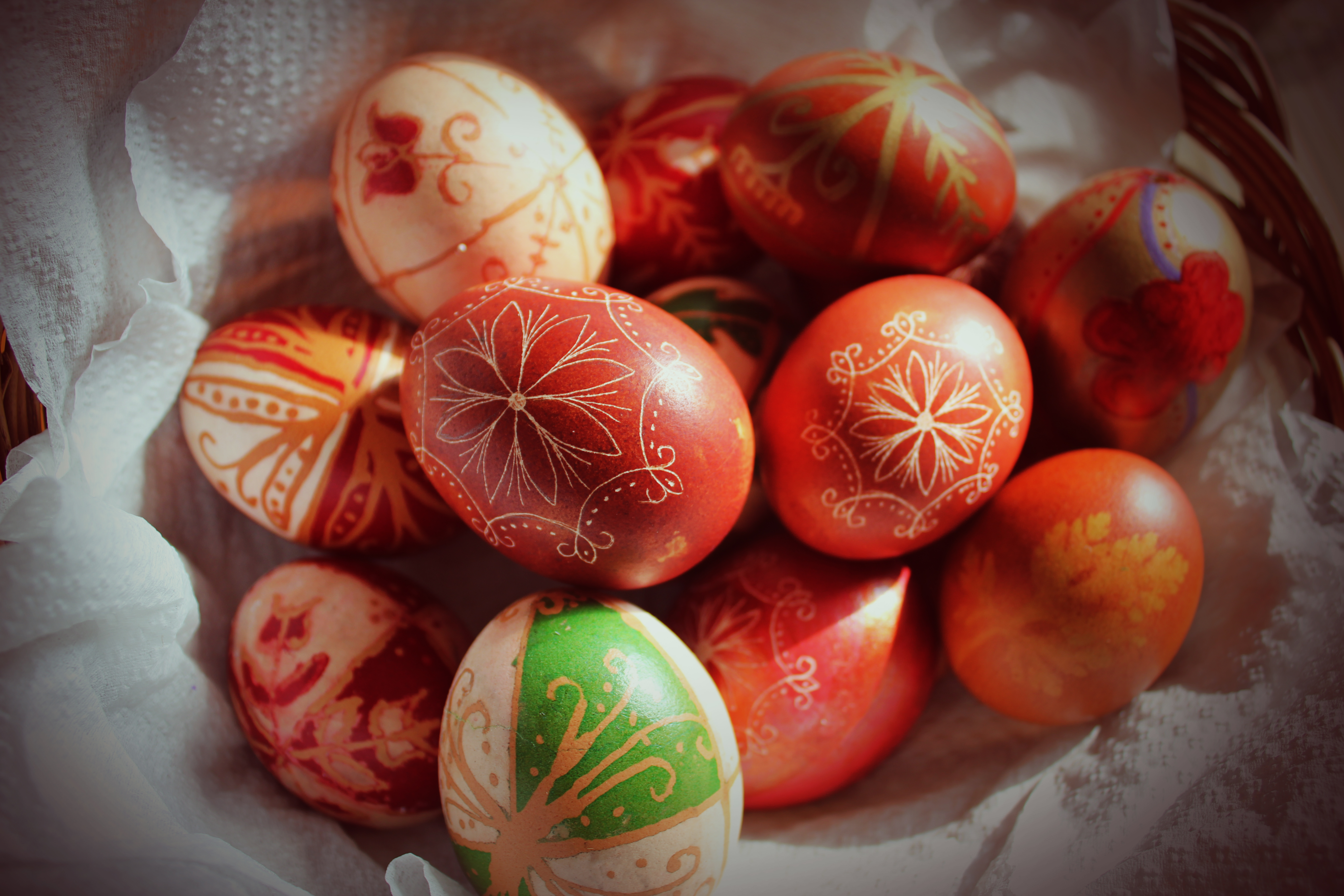
The sprinklers then pass the door one after the other, or in groups. Those who drive, of course, may be able to taste a homemade elderberry syrup. Oh, you, do like the nut cake? A grandmother’s recipe! Enjoy it!
And here we are, smiling, sometimes even unable to speak, retrieving friends from primary school … but just enough time to hear from their family and here they are to resume their journey; it is because others are waiting for them, and it is incorrect to arrive in the afternoon: to arrive in the afternoon is to be watered back by the girls! So our friends are back on their way, but not without a farewell round. And of course, no way anyone is leaving without tasting the “Jánosáldás” – the “Blessing of John”, blessed wine at St. John’s, offered to visitors on the departure, Ed.. Of course, no girl from Hungary would accept the shame from letting her sprinklers leave without offering them a good little “pálinka” – homemade fruit brandy, Ed..
It is important to water all women, so that none will fade. Formerly, the custom was only for girls, but today it does not spare grandmothers … which must however be watered like delicate little flowers, gently.
So we see the gangs of young boys in all the streets, a bottle or a bucket in their hands … of course, the girls always prepare spare clothes … but, let’s say it to the boys’ credit, they all learn by heart a rhyme, and it is not uncommon for them to write it themselves. Tradition maintains itself. “Of course I’m preparing a new poem this year too, after all, you girls spent a whole day painting the more beautiful eggs for me. And I always get beautiful red eggs! My poetry is the least I can do for you, right?” told me last year one of my sprinklers.
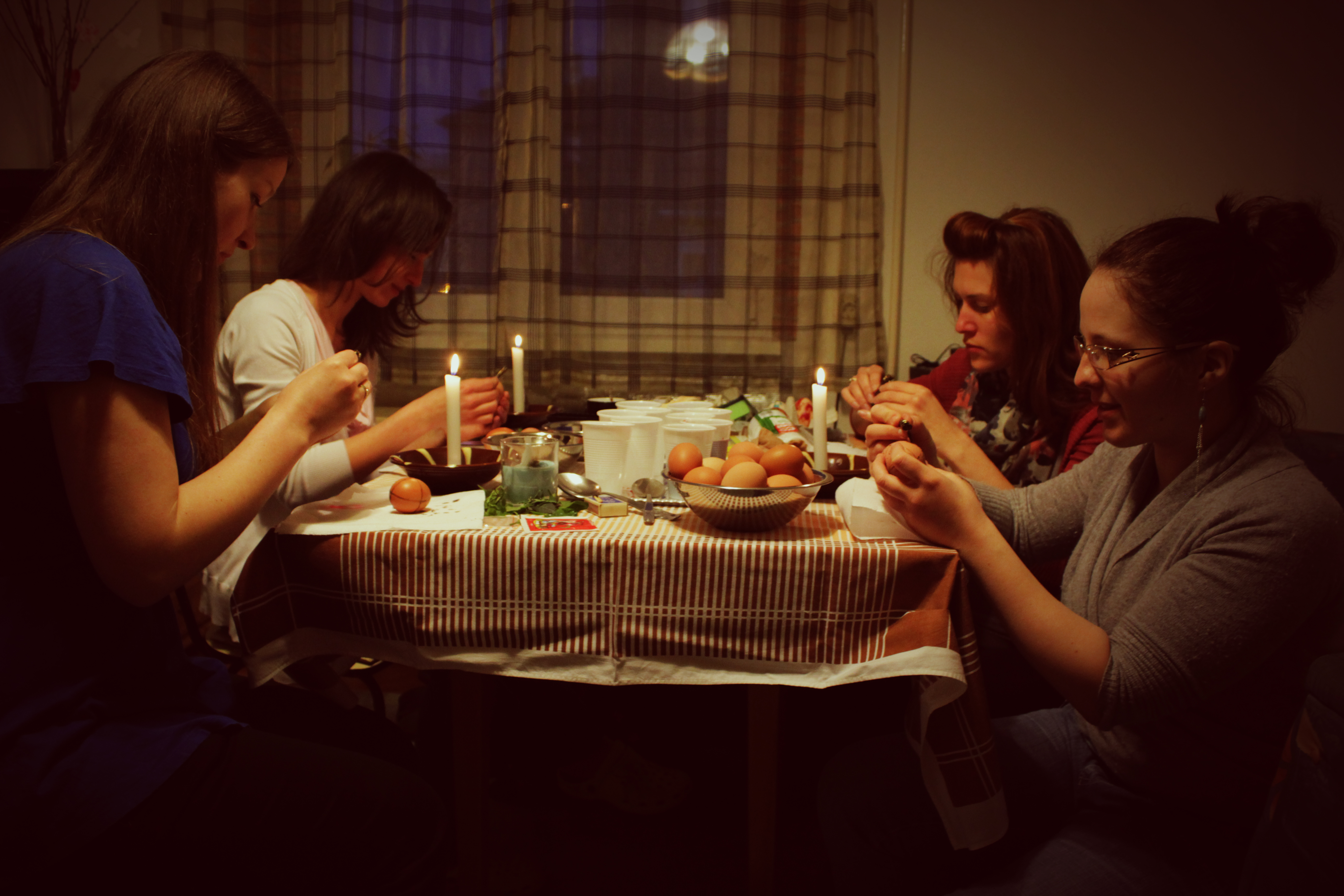
And then in the evening, once everyone has had time to sober up, sprinklers balls are held all over the country. This only concerns the more traditional circles, and the rural communities. And then, all those who wish to dance find themselves for, until dawn, heat up the floor on folk music.
It is interesting to note that the Easter religious feast and the watering tradition have merged so much in Hungary that a priest from western Hungary has even set up his own “watering blessing”, which consists, on the morning of Easter Monday, in making a cross on the forehead of women with holy oil.
At Easter, those who are more attached to the religion can pass the Triduum in holy places, churches or centers run by the Church. These places are innumerable, and the faithfuls are awaited for the liturgy and the contemplations. Some go with family, others with friends, but this period before Easter does not relate to the community but rather to oneself, in front of one’s soul. Those who do not go on a spiritual retreat, however, go to Easter Mass, which is, after all, the most important holiday of Christendom. After the resurrection of the third day and the liturgy of celebration come the celebration with the family: it is time for ham with horseradish – first consumption of meat after Lent. A must-have for Easter decorations are the twigs of pussy willow, which have been blessed on Palm Sunday, and which, for climatic reasons, replace the palm leaves and olive branches that were then used to welcome Jesus while entering Jerusalem. On these branches, placed in vases, we hang our most beautiful eggs accumulated over the years.
For the little ones, we often hide “nests” in the garden at Easter, so that they seek them as best as they can. In the nests, rabbits and chocolate eggs. And if you want to know why in Hungary rabbits lay eggs at Easter, and what is the link with our watering tradition, I think you should ask the young men who, on the afternoon of Easter Monday, stagger and help each other to walk while trying to get home. A priori, they must have the answer … but it remains to know if they will be able to give it.
Article written for the Visegrád Post and published in Hungarian on the author’s blog.


